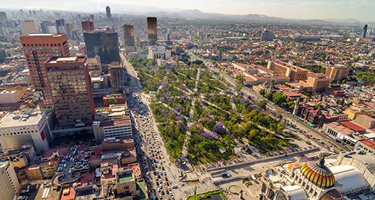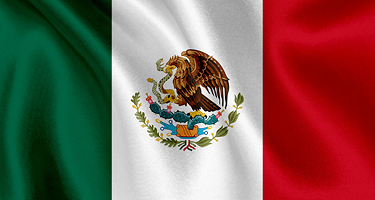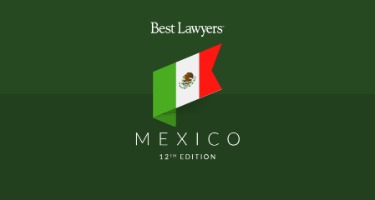The amendments to the Federal Labor Law published on May 1st 2019 establish new provisions relating to the execution, revision and registration of collective bargaining agreements, and to the formation, election procedures of leaders, administration and transparency of unions.
We highlight the most important novelties in this informative note.
COLLECTIVE BARGAINING RIGHTS
1. The personal, free, direct and secret vote of workers as a guarantee for the protection of the freedom of collective bargaining.
The amendments to the Federal Labor Law establish as a requirement for the validity of the execution of collective bargaining agreements that it is proven, in accordance with the procedures established by law, that the workers have effectively elected the union representing them in the negotiation and execution of such agreement, and that is has been verified that the workers know the content of the collective bargaining agreement, its potential revision or termination with the expression of their personal, free, direct and secret vote.
Authorities, unions and employers are ordered to ensure that the procedures for consulting workers are organized in such a way that they do not affect the work activities of the work centers.
2. Employer's obligation to enter into a collective bargaining agreement.
An employer who employs workers who are members of a trade union shall be obliged to enter into a collective bargaining agreement with the trade union at its request. The union must previously have a Certificate of Representation issued by the Federal Center for Conciliation and Registration to request the execution of the collective bargaining agreement.
The Certificate of Representation ensures that the union represents at least 30% of the workers who will be governed by the collective bargaining agreement. If the employer refuses to sign the contract, the workers may exercise the right to strike. The Certificate of Representation must be accompanied to notice of intention to strike as an indispensable requirement for the notice to be processed.
The Certificate of Representation will be valid for six months from the date on which it is issued. In the event that a strike is triggered by the calling union, the validity of the Certificate will be extended until the end of the conflict, so that no other request shall be processed during its validity, nor shall any other union or unions be admitted as part of the procedure.
Unions will be legally prevented from requesting an employer to sign a collective bargaining agreement and exercise the right to strike if they do not previously obtain the Certificate of Representation from the Federal Conciliation and Registration Center. In the event that several unions wish to request the initial signing of a collective bargaining agreement from an employer, the union that obtains the majority of the workers' votes during the process to obtain the Certificate of Representation will be the only one that has the right to request the execution and signing of the Collective Bargaining Agreement. The union that obtains the majority must count at least 30% of the votes of the workers that will be governed by the collective bargaining agreement in order to be granted the Certificate of Representation.
The union that represents the majority will be the only one that has the right to sign, administer and request the revision of the collective bargaining agreement that governs the workplace. As in the Law prior to the decree, there may only be several collective bargaining agreements in a workplace when there is a union representing the majority of the workers in a specific workers' guild. The loss of the majority of the workers after a court ruling, after consulting the workers through personal, free and secret vote, results in loss of ownership of the collective labor contract.
3. Registration of Collective Bargaining Agreements
The collective bargaining agreement between the union and the employer must be registered with the Federal Conciliation and Registration Center. For the registration of an initial collective bargaining agreement, it will be necessary to submit the Certificate of Representation to the Federal Center for Conciliation and Registration in addition to the Collective Labor Agreement, which specifies its scope of application.
The Federal Center for Conciliation and Registration must decide on the registration of the collective bargaining agreement within thirty days of its presentation. In accordance with the foregoing, the collective bargaining agreements shall not take effect until the agreement is issued approving its registration by the Registration Authority.
4. Procedure for obtaining a Certificate of Representation.
In order to request the execution of the initial collective bargaining agreement, it shall be indispensable for the union to obtain from the Federal Center for Conciliation a Certificate of Representation, which shall be issued by prior consultation with the workers by means of a personal, free and secret vote.
The request to obtain the Certificate of Representation must be presented by one or several unions before the Federal Center for Conciliation and Registry. The request must be accompanied by a list accrediting that the applicant union has the backing of at least 30% of the workers covered by the collective bargaining agreement. The list must include the name, Unique Population Registry Code (“CURP”), date of hire and signature of the workers supporting the applicant union.
The Federal Center for Conciliation and Registration will immediately publish on its website the notice of request for the Certificate of Representation, will post such notice in the workplace and will request the employer to advertise it in the places of greatest affluence for the knowledge of workers and any other union that wishes to adhere to the request for obtaining the Certificate of Representation, who under such circumstances must also accompany a list that proves that it has the support of at least 30% of the workers covered by the collective bargaining agreement.
If only one union requests the Certificate of Representation, its representation will be considered accredited when it has the backing of at least 30% of the workers covered by the collective bargaining agreement and the Federal Center for Conciliation and Registry, if applicable, will issue the corresponding proof. If two or more unions request the Certificate of Representation, the right to negotiate and enter into the collective bargaining agreement shall correspond to the right obtained during the process, to obtain the Certificate of Representation, the highest number of votes, provided that it obtains at least 30% of the workers covered by the collective bargaining
In order to determine the majority union, the Federal Labor Conciliation and Registration Center will prepare a reliable register of workers in the labor center that will be consulted by personal, free, direct and secret vote, excluding workers of confidence and those who have entered after the submission of the application.
The vote of the workers shall be made on the day, time and place as indicated, in a personal, free, direct and secret manner. For this purpose, the Registration Authority shall order as many ballots as workers have been accredited, which shall be duly foliated, sealed, and authorized with the signature of the official commissioned by said authority.
During the voting procedure, no worker may wear any color, stickers, emblems, or any other element that distinguishes him or her as a member or sympathizer of any of the applicant unions. At the conclusion of the voting, the authorized officer of the Registration Authority shall proceed to scrutinize each ballot box and shall proceed to count the votes and announce the result.Once the procedure has been substantiated, the Federal Center for Conciliation and Registration shall decide on the origin of the request for the Certificate of Representation; if appropriate, it shall issue the corresponding proof.
5. Consultation of the workers for the initial collective agreement registration of the revision or modification of the collective bargaining contract.
For the registration of an initial collective agreement or a revision agreement, the Federal Conciliation and Registration Center will verify that its contents are approved by the majority of the workers covered by it through a personal, free and secret vote. The procedure of consultation with the workers shall be carried out in accordance with the following provisions:
- Once the terms of the collective bargaining agreement or its revision have been agreed upon between the employer and the union, the union shall notify the Federal Conciliation and Registration Center, which shall submit the approval of the contents of the contract to the workers for consultation.
- In the consultation, the workers must express, by means of a personal, free and secret vote, their knowledge, approval or disapproval of the collective contract or revision agreement signed by the parties.
- In the consultation procedure, the personal, free and secret vote of the workers shall be exercised individually and directly.
- In order to consult the workers, the union must make available to the workers a copy of the initial collective agreement or of the revision agreement that will be submitted for consultation.
- The employer may not intervene during the consultation procedure.
- The union shall give notice of the result of the vote to the Federal Conciliation and Registration Center so that it may publish it on its website.
- If there are inconsistencies in the substantive facts of the process, the Federal Center for Conciliation and Registration will declare the consultation null and order its replacement.
- The voting records will be kept for five years to accredit the fulfillment of this obligation, for purposes of verification of the labor or Registry Authority.
- If the result of the consultation shows that the content of the initial collective bargaining agreement or the revision agreement has the support of a majority of the workers, the following shall apply:
› For initial collective bargaining agreements, the union shall proceed to make the application for registration before the Registration Authority.
› Agreements to revise or amend the collective bargaining agreement must be entered into with the competent Registration Authority, Court or Conciliation Center, and once approved, it shall have legal effect.
- In the event that the consultation shows that the content of the initial collective bargaining agreement or the revision agreement does not have the support of a majority of the workers covered by it, the union may:
› Exercise its right to strike, if it has issued the corresponding notice.
› Extend or expand the pre-strike period in order to continue negotiations and submit the agreement for further consultation.
- The agreement for the revision or modification of the collective bargaining agreement must be entered into before the Registration Authority, the Labor Court or Conciliation Center and once approved by the authority, it will have legal effects. This provision intends that increases in salary or benefits or modifications to the collective contract are valid only if they are celebrated and approved before the labor authority, which conditions the increase or modification of labor conditions to the approval of said authority.
- The agreement for the comprehensive review of the collective bargaining agreement (clauses and salaries), which is normally entered into every two years, must be submitted for the approval of the majority of the workers governed by it through personal, free and secret vote, in accordance with the consultation procedure. There is no explicit obligation that the annual wage review agreement for collective bargaining agreements must be submitted for approval by the majority of workers through personal, free and secret ballot.
- Contractual review agreements must be deposited with the Federal Conciliation and Registration Center, which may verify that the content of the collective bargaining agreement has been made known to the workers.
- Collective bargaining agreements may not contain a separation exclusion clause, understood as one that establishes that workers who cease to belong to the union may be separated from their employment.
6. Notice of intention to strike for the purpose of entering into a Collective Bargaining Agreement
When the purpose of the strike procedure is to obtain from the employer the execution of the initial collective bargaining agreement, the Certificate of Representation issued by the Federal Conciliation and Registration Center must be attached to the notice of intention to strike.
When the purpose of the strike procedure is (i) to achieve a balance between the factors of production, (ii) to demand compliance with the collective bargaining agreement, (iii) to demand compliance with the legal provisions on profit sharing, (iv) to support a strike, (v) to demand the revision of contractual wages, and (vi) to demand its revision at the end of its term, the accredited union that it is the holder of the collective bargaining agreement must attach to the strike notice the Certificate of Registration of the Collective Bargaining Agreement issued by the Federal Conciliation and Registration Center, or the acknowledgement of having requested it.
7. Demand for ownership of collective bargaining agreements.
As in the Law prior to the decree, unions that consider themselves to represent the majority of the workers of a work center in which a collective bargaining agreement is in force, may start proceedings before the labor courts to determine that the union effectively represents the majority of the workers and has the right to be the owner of the collective bargaining agreement.
In a recount, the workers will choose, by means of their personal, free and secret vote, the union who should represent them and be the rightful owner of the collective bargaining agreement of their work center. Loss of support of the majority of the workers will cause the union to lose ownership of the collective bargaining agreement.
In order to process a demand for ownership of collective bargaining agreement, the claimant union will not be required to have previous accreditation that it represents some percentage of the workers' interest in the workplace, and the recount shall be the only measure to determine that the union represents the majority of the workers and the right to be the owner of the collective bargaining agreement.
8. Term for the beginning of operation of the Federal Center for Conciliation and Registration.
In accordance with the third transitory article of the reform, the Federal Center for Conciliation and Registration will begin its functions regarding the registration of labor unions and collective bargaining agreements within a period of two years, starting on May 2, 2019.
Until the Federal Conciliation and Registration Center does not begin its functions, the Conciliation and Arbitration Boards, as well as the Ministry of Labor and Social Security shall continue with the registry functions provided for in the Federal Labor Law applicable at the time of the entry into force of the Decree.
9. Mandatory revision of collective bargaining agreements at least once in the next 4 years.
According to the Eleventh Transitory Article of the reform, aimed to comply with Article 123 paragraph "A", section XVIII, second paragraph and XX Bis of the Constitution and the international commitments assumed by the Mexican State, the existing Collective Labor Contracts must be reviewed at least once during the four years following the entry into force of the Law.
Contractual revisions must be deposited with the Federal Conciliation and Registration Center, which will verify that the workers have been made aware of the contents of the Collective Bargaining Agreement and that they were given a copy of it by the employer; likewise, that this contract has the backing of the majority of workers by means of a personal, free and secret vote.
10. Protocol to carry out the verification of consultation of workers.
Within a period of three months following the entry into force of the decree, the Ministry of Labor and Social Security shall establish the protocol to carry out the verification of the consultation of the workers on the content of the Collective Labor Agreement and the support of the majority of the workers. The Federal Conciliation and Arbitration Board will be involved as established by said protocol.
As long as this protocol for the consultation of workers is not established, or the Federal Conciliation and Registration Center is not operational, the deposit of collective bargaining agreements or their revision shall not be valid to accredit that it is known and supported by the majority of the workers.
If at the end of the 4-year term, the collective bargaining agreement subject to consultation does not have the majority support of the workers or the aforementioned consultation is omitted, it shall be terminated, and the benefits and working conditions contemplated in the collective bargaining agreement shall be retained for the benefit of the workers.
Pursuant to this transitory agreement, all current collective bargaining agreements must be reviewed at least once in the next 4 years and deposited with the Federal Conciliation and Registration Center, which must verify that the workers have been made aware of the contents of the Collective Bargaining Agreement, of which they were given a copy, and which is supported by the majority of workers by means of a personal, free and secret vote. If at the end of 4 years it is not proven that the Collective Bargaining Agreement has the majority support of the workers or the consultation is omitted, it shall be terminated.
TRADE UNIONS
On February 24th 2017, article 123 of the Constitution was reformed, seeking the principles of (a) representation in trade union organizations and (b) certainty in the signing, registration and deposit of collective agreements, for which it ordered the implementation of various provisions that will guarantee trade union democracy.
The amendment to the Federal Labor Law published on May 1st 2019, in compliance with the principle of representation in union organizations and in accordance with ILO Convention 98 ratified by Mexico, establishes new provisions relating to training, election of leaders, administration and transparency of trade unions. The following points stand out as important novelties in this reform:
1. Free affiliation and internal participation
It is established that members of trade unions, federations and confederations have the rights of free affiliation and participation within them, which implies the following guarantees:
- That no one may be forced to form or not form part of a trade union, federation or confederation.
- That the election procedures of the union leaders must be by means of personal, free, direct and secret vote of their members.
- That the period of duration of the union leaders cannot be indefinite, or such that it hinders the democratic participation of the members.
- The leaders of trade unions, federations and confederations shall give workers a full and detailed account of the administration of their income and assets.
2. Cancellation of union registrations for extortion.
The amendments to the Federal labor law includes a new cause for the cancellation of the registration of unions, federations and confederations if their leaders, attorneys or legal representatives incur in acts of extortion against employers demanding payment to desist from a strike or to refrain from initiating or continuing with a claim of ownership of the collective bargaining agreement. This conduct may serve as the basis for a legal action and cancellation of the union’s Certificate of Representation.
3. Registration at the Federal Conciliation and Registration Center.
All unions in the country must register with the Federal Conciliation and Registration Center. This Center shall make public, for consultation by any person, the information of the records of the unions and issue copies of the documents contained in the records of the registries to anyone who requests it.
4. Procedure for the election of the board of directors and union sections.
- The call for the election of the board of directors and union departments shall comprise a complete and up-to-date register of the members of the union entitled to vote, which shall be published and made public.
- It shall be ensured that the voting of members takes place in a safe, direct, personal, free and secret manner.
- If any of these are not complied with, the election procedure will not validate the election, either at a general or department level, as the case may be.
- In the integration of trade union management there must be proportional representation on the basis of gender.
- The directors of the union or 30% of its members may request assistance from the Federal Conciliation and Registration Center or from the Federal Labor Inspectorate of the Ministry of Labor and Social Security, in order to verify and certify compliance with the requirements for the election of union leaders.
5. Accountability of union assets.
The reform ratifies that the unions shall render to the assembly of their members every six months a complete and detailed account of the administration of the union’s income and assets.
Accountability shall include the status of the income from union dues and other assets, as well as their destination, and the minutes of such assembly shall be drawn up and be made public in the following manner:
- The minutes of the meeting in which the administration of the union patrimony is rendered must be delivered within the following ten days to the Federal Conciliation and Registration Center for deposit and registration in the Union Registry File.
- The foregoing information must be delivered in writing to each member of the union in full, and receipt of such information must be formally acknowledged.
- The obligations referred to in the preceding paragraphs are not waivable.
It is to be expected that the need to disclose income and assets will not only lead to more transparency, but also generate tensions between union leaders and workers. Certain groups that oppose union leaders will constantly demand greater clarity and insight in the administration of the union, limiting compensation and political incentives for its leaders, and possibly causing some unions to disappear.
6. New powers for trade unions, federations and confederations.
Unions are empowered to establish (i) mechanisms to promote the development and strengthening of the economy of trade union members, and (ii) to manage cooperative societies and savings banks for their members, as well as any other similar arrangements.
These new powers are intended to enable unions to help improve the standard of living of their members, providing various benefits outside the formal employment relationship, without having to resort to the formation of companies or cooperatives outside the union.
7. New regulations and restrictions for trade unions.
Several new restrictions are imposed on unions, resulting from a series of bad practices that some unions have carried out in the past:
- Participate in schemes of evasion of contributions or non-compliance with employer obligations towards workers.
- Exercising acts of violence against its members, the employer, their representatives or their property, or against third parties.
- Participate in acts of simulation assuming the character of employer, so that the true employer evades its responsibilities.
- Use certificates indicating that the workers have voted or been consulted without these having actions actually taking place.
- Obstructing the participation of workers in the election procedures of their union leaders.
- Committing acts of extortion or obtaining donations from the employer, outside the collective bargaining agreement.





























